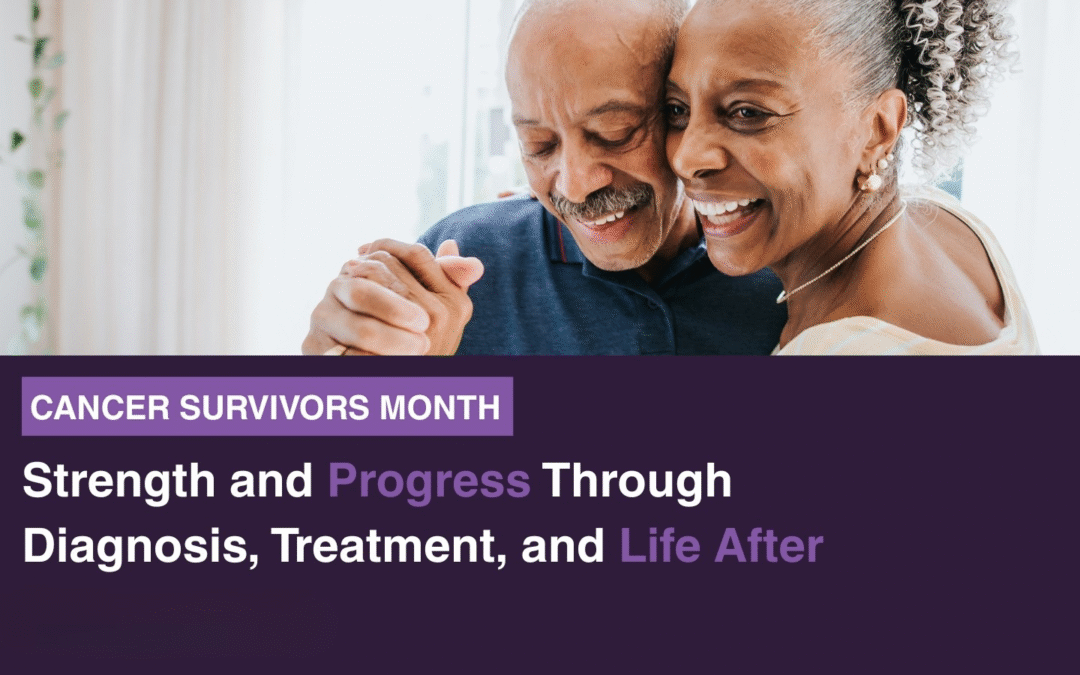Cancer touches nearly every life, whether through a personal diagnosis or through the impact on family, friends, or colleagues. It remains one of the world’s most pressing health challenges as the World Health Organization reports, cancer was responsible for nearly 10 million deaths in 2020—accounting for roughly one in every six deaths. While we will always honor and remember those we’ve lost to cancer, we also recognize and celebrate the more than 18 million cancer survivors living in the United States today.
National Cancer Survivors Month, first recognized in 1988, shines a light on the unique challenges survivors face after treatment while celebrating life beyond a cancer diagnosis. Throughout the month, advocates across the country host educational events, awareness campaigns, and community gatherings to support survivors and their families, promote understanding, and highlight the importance of ongoing care.
Recognizing the Unique Needs of Survivors
As early detection methods, treatments, and research continue to advance, more people are surviving cancer than ever before. However, survivorship doesn’t end when treatment does; it begins at the moment of diagnosis and continues throughout a person’s life.
National Cancer Survivors Month reminds us that supporting those who have experienced cancer means understanding and addressing their evolving needs, long after the last appointment. For many, the end of treatment marks the beginning of a new chapter filled with hope, adjustments, and uncertainty, which can include:
- Long-term side effects like fatigue, nerve damage, or changes in mobility.
- Mental, emotional, and spiritual health challenges, including anxiety about recurrence, body image concerns, and the impact cancer may have had on relationships, identity, or daily life.
- Long-term health maintenance, including nutrition, exercise, preventative care, and healthy habits to support overall well-being after treatment.
- Practical concerns like returning to work, navigating insurance or medical bills, and finding ongoing support.
Recognizing these realities helps understand that “surviving” cancer is much more than being cancer free—it’s about finding a new normal and thriving beyond the diagnosis.
National Resources for Survivors: From Diagnosis Through End of Treatment
While each cancer diagnosis and treatment path are unique, many survivors and their families face similar feelings of uncertainty, fatigue, and overwhelm during recovery. Reliable support can make a meaningful difference. Here are some key resources:
- American Cancer Society 24/7 Helpline (1-800-227-2345): connects callers with trained specialists for cancer diagnosis questions, guidance, or to offer a listening ear.
- The American Cancer Society: provides access to online support groups, transportation and lodging programs, and many additional resources to ease the burden of treatment and recovery.
- The Cancer Survivors Network: creates peer connections for survivors, caregivers, and families who may be experiencing similar journeys.
- The National Cancer Institute Division of Cancer Control & Population Sciences: offers educational videos, wellness guides, follow-up care tips, and survivorship planning support.
Supporting Survivors: How Caregivers, Family, and Friends Can Help
Though the cancer diagnosis is personal, the journey of healing and adjustment involves everyone around the survivor. Emotional support, practical help, and simply being there make a meaningful difference beyond treatment. Helping survivors rebuild their lives physically, emotionally, and socially is vital to recovery. Here are some of the most important ways to support survivors moving forward:
- Listen without judgement: often, the most powerful support is simply being present and allowing survivors to share their stories in their own time.
- Practical help – everyday tasks like errands, cooking, or childcare can feel overwhelming after diagnosis or treatment. Offering specific help, rather than saying “let me know if you need anything” often goes a long way.
- Educate yourself – learning about survivorship and long-term effects of cancer can create a better understanding of what a loved one might be going through.
- Join or support a cause – volunteer, donate, or participate in events that raise awareness and funds for survivorship programs, research or patient advocacy.
- Stay in touch, be there, and celebrate milestones – after the initial diagnosis or treatment period, support can fade as life continues. Survivorship is lifelong and presence matters. Acknowledge anniversaries, treatment updates, or moments of strength reinforce resilience and hope, even months or years later.
By recognizing and lending a hand to these needs, we can create a culture that supports healing, not just surviving.
We Support National Cancer Survivors Month
Cancer survivorship is a deeply personal experience. While every journey differs, the core truth remains: a survivor’s life is forever changed after diagnosis, treatment, and living through cancer.
As we observe National Cancer Survivors Month, consider how you can offer support—whether through a kind conversation, volunteering your time, or spreading awareness. Together, we can help survivors not only survive but truly thrive.

